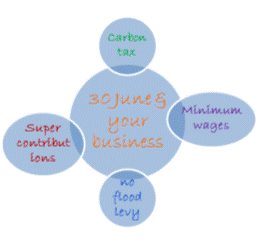I hope you find my writing and business tips and observations useful. My business and blog are dedicated to helping businesses communicate clearly and reach their potential.
Read, subscribe to my newsletter, enjoy!Tash
Is your business prepared for 2012-13?
 With one week to go in this financial year, I thought it a good time to remind you of some changes that come into effect on 1 July.
With one week to go in this financial year, I thought it a good time to remind you of some changes that come into effect on 1 July.
- the carbon tax starts – find out more about pricing impacts on the ACCC website
- minimum weekly wages increase by 2.9% so if you employ anyone at minimum rates (including apprentices, trainees and juniors) make sure you are meeting the Fair Work Australia requirements
- new individual PAYG tax rates change – namely the tax-free threshold is increasingly significantly. Make sure your payroll software has been updated with the new rates before your first pay run
- the flood levy finishes on 30 June so if you have been deducting this from employees’ pays, remember to stop!
- the superannuation co-contribution rate is halving to $0.50 per $1 you contribute, so if you qualify this year, you have a few days left to make a personal contribution to get this
- concessional superannuation contributions (those from your employer, salary sacrifice or that you claim a tax deduction on) will be capped at $25,000 regardless of your age or situation. Check your contribution rates for 2012-13 so you don’t get any nasty tax surprises…
Have you implemented all of the relevant changes for your business?
If you’re looking for some tips for the end of financial year, some of my previous posts may help:
Preparing for the end of financial year
Maximise your 30 June position
Keeping your accounting issues under control
Understanding profit and paying yourself
Take a reading…
Tomorrow is the first of July and first of a new financial year.
One task I noted for today was to check my odometer readings so I can finish last year’s care records and start this year’s. Even if you don’t use the car a lot for business, it is still useful to note the readings at this time of year.
What other things do you need to take note of today (or tomorrow) to track your business for marketing and growth purposes, as well as accounting purposes?
Preparing for 30 June…
It is now June and the end of financial year is rapidly approaching – are you ready for it?
Here are some of the things I am considering at the moment to maximise my position at 30 June. Is there anything else you do at this time of year?
- send out all pending invoices and statements as soon as possible – not only does it increase your cash flow this month, many other businesses will appreciate being able to pay (and claim a tax deduction) this financial year
- pay off all outstanding invoices if possible – you may as well claim deductions now rather than in 13 months time! And the new tax rates may mean deductions this year will help your tax position anyway
- consider making a contribution to your super fund – this is tax deductible for the self-employed now
- if you or your business supports a charity and you haven’t made a donation yet, now is a good time to do so as it can then count as a tax deduction this financial year – I wonder how much their donations go up in June each year!
- if you are eligible for a Government Co-contribution, your personal contributions of up to $1,000 must be made to your super fund by 30 June – and changes from the budget or an increased income next year may mean you aren’t eligible next year so get in while you can!
- consider making business purchases that will be needed soon. Not only can you claim it as a tax deduction, it may save you stress when you do actually need the item – printers notoriously run out of ink the day your proposal is due!
- get your accounts sorted and in order – the more organised they are, the quicker you (or your accountant/tax agent) can get the return completed and submitted
- collate related information, such as a travel log or noting the distances travelled, home office bills, private health insurance policy details, bank statements and PAYG statements
- if you run a service business, check the proportion of income from each client as tax rules can change if more than 80% of your income is from one source. There’s not a lot of time to adjust that, but if you’re on 81 or 82% a few quick projects may make a difference
- consider taking out health insurance if you are a higher income earner ($50,000 for a single or $100,00 for a couple/family) – the higher income brackets come into effect from 1 July 2008
- check if there are any expenses you can (and will benefit from) pay now rather than later in the year – for example, insurance premiums and interest on investment loans can be paid in advance to be claimed as a tax deduction now, and are sometimes cheaper paid as a lump sum. Obviously, this affects cash flow and other factors so is not always the best plan, but it never hurts to research your options!
By preparing now, you may decrease your tax liability and be ready to start the new financial year with a clean slate.

Recent Comments